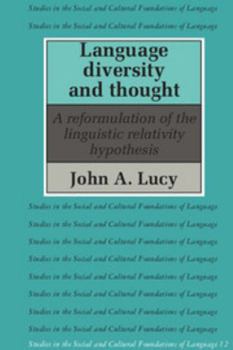Language Diversity and Thought: A Reformulation of the Linguistic Relativity Hypothesis
(Part of the Studies in the Social and Cultural Foundations of Language Series)
Select Format
Select Condition 
Book Overview
Language Diversity and Thought examines the Sapir-Whorf linguistic relativity hypothesis: the proposal that the grammar of the particular language that we speak affects the way we think about reality. Adopting a historical approach, the book reviews the various lines of empirical inquiry that arose in America in response to the ideas of anthropologists Edward Sapir and Benjamin L. Whorf. John Lucy asks why there has been so little fruitful empirical research on this problem and what lessons can be learned from past work. He then proposes a new, more adequate approach to future empirical research. A companion volume, Grammatical Categories and Cognition, illustrates the proposed approach with an original case study. The study compares the grammar of American English with that of Yucatec Maya, an indigenous language spoken in southeastern Mexico, and then identifies distinctive patterns of thinking related to the differences between the two languages.
Format:Paperback
Language:English
ISBN:0521387973
ISBN13:9780521387972
Release Date:July 1992
Publisher:Cambridge University Press
Length:344 Pages
Weight:1.15 lbs.
Dimensions:0.7" x 5.8" x 8.9"
Customer Reviews
1 rating
Relativism defended.
Published by Thriftbooks.com User , 27 years ago
With perhaps the exception of moral relativism, all forms of Relativism are out of fashion at the moment, a point Lucy is clear to point out. Lucy is to be congratulated on sticking with the issue, showing that relativism is far from dead. His book is based on clear scientific research, and is most convincing. This book should be read by all students of anthropology and linguistics, but more so by cognitive science students who are being taught that relativism is a dead issue. An excellent book!





